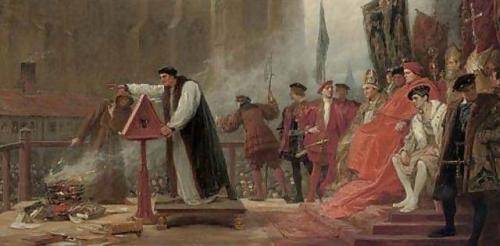Definitions are important; if for no other reason but to understand what something means. Context provides meaning, and thus definition, for words; whether that is in sentences, paragraphs, chapters, books, so on and so forth. When attempting to understand where a particular theologian lies, as far as classification, within the alternative types of being a theologian, it is important that we get a handle on the definitions used to ascertain that. In the medieval period, generally, a theologian could be classified as a scholastic theologian, or a Christian humanist; or potentially, both, depending on the way someone enters into the reconstruction of said history. There are general markers that broadly characterize a scholastic theologian from a Christian humanist theologian. 1) A scholastic theologian was, methodologically, committed to the dialectical methodology. This methodology entailed a presentation of: a) thesis, b) antithesis, c) synthesis. Beyond its formality, more materially, the scholastic was often an Aristotelian, and later, after Thomas Aquinas’ synthesis of Aristotle with Christian dogmatics, a Thomist. 2) A Christian humanist theologian was typified by an attempt to ad fontes (go back to the sources, behind the layers and accretions of beliefs the scholastics had developed), with a focus on understanding the original biblical languages (so getting beyond Latin); and by way of methodology, the Christian humanist didn’t necessarily attempt to synthesize ideas. The humanist believed, by reference to their set of literary and linguistic and historical tools, that they could arrive at a scenario, when deciding on the validity and soundness of this or that theological loci, that the theologian should be able to say: Yes or No.
The above is the world that Martin Luther, and the magisterial reformers in general, were birthed into. There is argument on whether or not Luther was more scholastic or more humanist in his approach. For my money, Luther, fit more broadly, within the school of the Christian humanists (we could refer to Lorenzo Valla here to underscore the genesis of the humanist way). Some would argue that to drive too hard of a wedge between the scholastics and the humanists in the late medieval and early reformation period, would be to engage in presenting a false dilemma. These folks would prefer that we understand that these “schools” were not as nice and tidy as we might make them today; that there was an organic crossover between the schools, materials, and methods of the two camps. Be that as it may, Brian Gerrish, via Charles Partee’s engagement, believes Luther fits the Christian humanist, or even the biblical humanist classification; as both a theologian and reformer of the Latin church.
Brian A. Gerrish raises “the possibility that perhaps Luther may be, indeed should be, classed with the so-called ‘Biblical Humanists” [sic] A sounder basis for excluding Luther, not from humanism in general, but from the notion of Christian philosophy in particular, is the fact that Luther insists that philosophy and theology should be carefully distinguished. Luther sees philosophy as the theology of the heathens. With this understanding Luther is less interested in studying philosophy with appreciative intent than others.[1]
Theologically, we might suggest that Luther’s infamous theologia crucis (‘theology of the cross’) fits well with the Christian or Biblical humanist orientation. It rejects the philosophical and speculative measures deployed by the theologians of glory, and instead focuses on the concreto of God’s Self-revelation in Jesus Christ; particularly as the character of God is given full magnification in the Son’s “obedience of death, even unto death on the cross.” The theology of the cross, repudiates speculating about a God up yonder, and entrenches itself within the Light of Light of God that is given for the world in God’s life for the world, in the person of God for the world in Jesus Christ.
This type of orientation, as the one we have just ostensibly observed in Luther, is present in someone like John Calvin; and beyond, into the modern period, we see this mood picked up by folks like Karl Barth and Thomas Torrance, respectively. It is this orientation that has drawn me to such theologians. I am, broadly speaking, a proponent of a form of Chrisitan humanism, as described in this post; and as illustrated by a suggestive proposal with reference to St. Martin Luther. So let it be written, so let it be done.
[1] Charles Partee, Calvin and Classical Philosophy (Leiden, Netherlands: E. J. Brill, 1977), 12-13.

